𝐃𝐨𝐧’𝐭 𝐌𝐢𝐬𝐬 𝐘𝐨𝐮𝐫 𝐑𝐞𝐬𝐭 𝐋𝐢𝐤𝐞 𝐈𝐬𝐫𝐚𝐞𝐥𝐢𝐭𝐞𝐬 𝐃𝐢𝐝…
Therefore, while the promise of entering His rest still remains and is freely offered to-day, let us fear, in case anyone of you may seem to come short of reaching it or think he has come too late. For indeed we have had the good news [of salvation] preached to us, just as the Israelites also [when the good news of the Promised Land came to them]; but the message they heard did not benefit them, because it was not united with faith [in God] by those who heard. For we who be-lieve [that is, we who personally trust and confidently rely on God] enter that rest [so we have His inner peace now because we are confident in our salvation, and assured of His power. ~ Hebrews 4:1-3a
Listen in and change…
Wikipedia defines busyness as having a great deal to do or keeping oneself occupied. I am more interested in the former portion – having a great deal to do – because it is a disease that I am well accustomed to.
Is there a way to know if we are too busy and getting into the red alert zone? Yes!

𝐈𝐟 𝐘𝐨𝐮 𝐂𝐚𝐧𝐧𝐨𝐭 𝐅𝐢𝐧𝐝 𝐓𝐢𝐦𝐞 𝐭𝐨 𝐁𝐞 𝐒𝐭𝐢𝐥𝐥 𝐁𝐞𝐟𝐨𝐫𝐞 𝐆𝐨𝐝, 𝐘𝐨𝐮 𝐀𝐫𝐞 𝐎𝐧 𝐑𝐞𝐝 𝐀𝐥𝐞𝐫𝐭 𝐙𝐨𝐧𝐞! Be still, and know that I am God. I will be exalted among the nations. I will be exalted in the earth! ~ Psalm 46:10

𝐋𝐞𝐭’𝐬 L𝐞𝐚𝐫𝐧 𝐭𝐨 𝐛𝐞 S𝐭𝐢𝐥𝐥 B𝐞𝐟𝐨𝐫𝐞 𝐆𝐨𝐝 (𝐏𝐬𝐚𝐥𝐦 𝟒𝟔:𝟏𝟎)
In the midst of life’s constant noise and busyness, finding moments of quiet and stillness can feel like an insurmountable challenge. We are bombarded with endless tasks, responsibilities, and distractions that make it difficult to pause and reflect. Yet, this hustle to find quiet is not just a luxury; it is a necessity for our spiritual well-being and alignment with our true purpose.
To walk in the original intent of work before the fall, we must strive to reconnect with the divine design that God established for us. Before sin entered the world, work was meant to be a joyful expression of our partnership with God, filled with purpose and fulfillment. However, the fall introduced toil, frustration, and a sense of separation from God’s presence.
To restore this original intent, we need to practice stillness and mindfulness, allowing ourselves to be fully present in the moment. This means setting aside time to quiet our minds, disengage from the busyness, and focus on God’s presence. It is in this stillness that we can truly “know that God is God” (Psalm 46:10).
When we are still, we open ourselves to hearing God’s voice, receiving His guidance, and experiencing His peace. It is a conscious effort to prioritize our spiritual connection over the clamor of daily life.
By doing so, we align ourselves with God’s original purpose for work, transforming it from a burdensome task into a sacred endeavor infused with meaning and joy.

𝐇𝐞𝐛𝐫𝐞𝐰𝐬 𝟒:𝟗-𝟏𝟏 𝐩𝐚𝐫𝐚𝐝𝐨𝐱: 𝐡𝐨𝐰 𝐜𝐚𝐧 𝐥𝐚𝐛𝐨𝐮𝐫 𝐥𝐞𝐚𝐝 𝐭𝐨 𝐫𝐞𝐬𝐭?
From Psalm 46:10 where we re commanded to be still and know God is God, Hebrews 4 tells us that our work or labour is to enter God’s rest.
This concept might seem paradoxical at first—how can labour lead to rest? Yet, this passage reveals a profound spiritual truth. Hebrews 4:9-11 says,
“𝑇ℎ𝑒𝑟𝑒 𝑟𝑒𝑚𝑎𝑖𝑛𝑠, 𝑡ℎ𝑒𝑛, 𝑎 𝑆𝑎𝑏𝑏𝑎𝑡ℎ-𝑟𝑒𝑠𝑡 𝑓𝑜𝑟 𝑡ℎ𝑒 𝑝𝑒𝑜𝑝𝑙𝑒 𝑜𝑓 𝐺𝑜𝑑; 𝑓𝑜𝑟 𝑎𝑛𝑦𝑜𝑛𝑒 𝑤ℎ𝑜 𝑒𝑛𝑡𝑒𝑟𝑠 𝐺𝑜𝑑’𝑠 𝑟𝑒𝑠𝑡 𝑎𝑙𝑠𝑜 𝑟𝑒𝑠𝑡𝑠 𝑓𝑟𝑜𝑚 𝑡ℎ𝑒𝑖𝑟 𝑤𝑜𝑟𝑘𝑠, 𝑗𝑢𝑠𝑡 𝑎𝑠 𝐺𝑜𝑑 𝑑𝑖𝑑 𝑓𝑟𝑜𝑚 𝐻𝑖𝑠. 𝐿𝑒𝑡 𝑢𝑠, 𝑡ℎ𝑒𝑟𝑒𝑓𝑜𝑟𝑒, 𝑚𝑎𝑘𝑒 𝑒𝑣𝑒𝑟𝑦 𝑒𝑓𝑓𝑜𝑟𝑡 𝑡𝑜 𝑒𝑛𝑡𝑒𝑟 𝑡ℎ𝑎𝑡 𝑟𝑒𝑠𝑡, 𝑠𝑜 𝑡ℎ𝑎𝑡 𝑛𝑜 𝑜𝑛𝑒 𝑤𝑖𝑙𝑙 𝑝𝑒𝑟𝑖𝑠ℎ 𝑏𝑦 𝑓𝑜𝑙𝑙𝑜𝑤𝑖𝑛𝑔 𝑡ℎ𝑒𝑖𝑟 𝑒𝑥𝑎𝑚𝑝𝑙𝑒 𝑜𝑓 𝑑𝑖𝑠𝑜𝑏𝑒𝑑𝑖𝑒𝑛𝑐𝑒.”
The rest referred to in this passage is not merely physical rest but a deeper, spiritual rest in God. It is a state of peace and trust in God’s sovereignty and provision, where we cease striving in our own strength and rely fully on Him. This rest is modeled after God’s own rest on the seventh day of creation, where He ceased from His work, declaring it complete and good.
Our labour, therefore, is to diligently seek and enter this rest. It involves a conscious effort to set aside our anxieties, ambitions, and self-reliance, and to place our faith in God’s promises and His completed work through Jesus Christ. Entering God’s rest means surrendering our will to His, trusting that He is in control and that His plans for us are perfect.
In practical terms, this might involve regular times of prayer, meditation on Scripture, and cultivating a mindset of gratitude and dependence on God.
It means recognising that our worth and identity are not tied to our achievements but are rooted in our relationship with Him. By making this our labour, we find true rest and peace, even amidst life’s chaos.
Thus, the work we are called to do is not about endless striving but about striving to let go, to trust, and to rest in the assurance of God’s love and grace.
This is the profound invitation of Hebrews 4—to enter into the Sabbath-rest that God offers, where our souls find true refreshment and renewal.
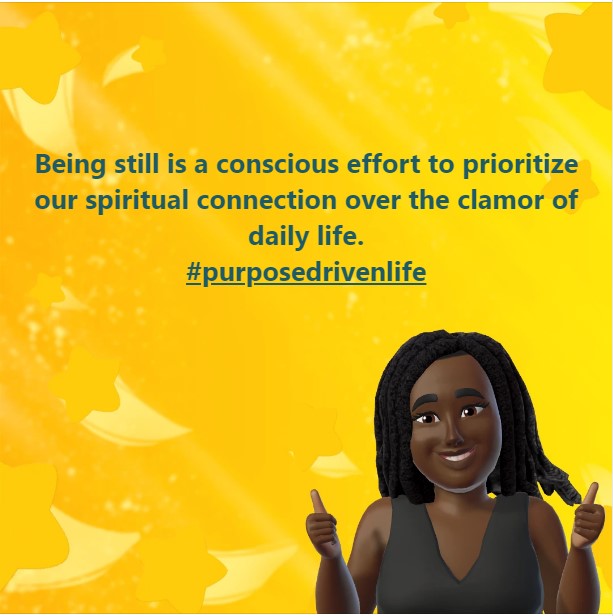
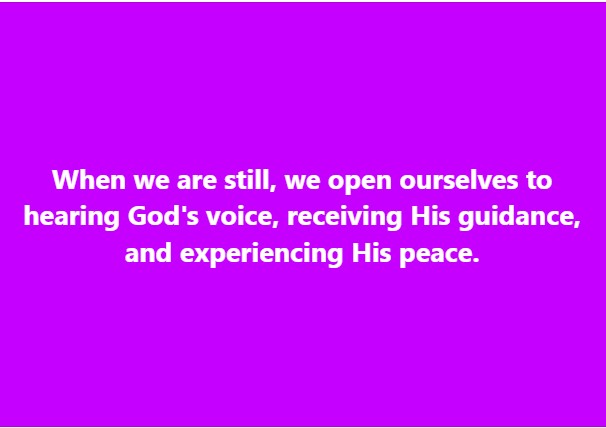

The rest referred to in Hebrews 4 is not merely physical rest but a deeper, spiritual rest in God. It is a state of peace and trust in God’s sovereignty and provision, where we cease striving in our own strength and rely fully on Him.

The work we are called to do is not about endless striving but about striving to let go, to trust, and to rest in the assurance of God’s love and grace so our souls can find true refreshment and renewal.

𝐌𝐲 𝐒𝐭𝐨𝐫𝐲: 𝐈 𝐇𝐞𝐚𝐫𝐝 𝐭𝐡𝐞 𝐂𝐨𝐦𝐦𝐚𝐧𝐝 𝐨𝐟 𝐆𝐨𝐝 𝐟𝐨𝐫 𝐌𝐞 𝐭𝐨 𝐌𝐨𝐯𝐞 𝐢𝐧𝐭𝐨 𝐅𝐮𝐥𝐥-𝐓𝐢𝐦𝐞 𝐔𝐧𝐩𝐚𝐢𝐝 𝐌𝐢𝐬𝐬𝐢𝐨𝐧𝐚𝐫𝐲 𝐖𝐨𝐫𝐤 at Christian Literature Communications – CLC Kenya
It took me about eight months to accept this call. I left a thriving business with a steady income to work for non-monetary remuneration. I remember laughing loudly one day and telling the Holy Spirit how I saw myself getting broke and struggling.
My husband did not have a steady income even though he was on a full-time contract with the same organisation. I could not see how we would manage to live in Nairobi, an unforgiving capital city that is merciless to those without financial power. This call could probably have worked in the rural setting – get a low rental house, have a small kitchen garden, plant a few vegetables, and survive on that as you wait on the Lord month after month.
When I joined the new organisation, I remember going from one month to another without lacking and the Lord sending ravens (not literal) to feed us. It was a life on the edge, and it was full of miracles, signs, and wonders. For a year, we lived beyond any money we could envision making.
Our bills were paid on time (for the most part), our children stayed in school with all their needs provided for (well, almost all their needs), and our table never lacked delicious meals (though not always the choicest of meals). I had the most confidence in everything I did. I could not do more or less than what the Lord had asked me to do at the missions organisation He sent me to.
There was neither an incentive to work better nor discouragement to do less because the organisation was not paying me. My sole focus was on hearing what God wanted me to do and then doing it with all diligence and to the best of my ability at the time. God was my employer, literally speaking, and I would ask Him for stuff – material things and payments for the work I was doing for Him (Matthew 6:4).
𝐆𝐨𝐝 𝐈𝐬 𝐍𝐨𝐭 𝐚 𝐃𝐞𝐛𝐭𝐨𝐫 𝐭𝐨 𝐀𝐧𝐲 𝐌𝐚𝐧 𝐇𝐞 𝐏𝐚𝐲𝐬 𝐀𝐥𝐥 𝐇𝐢𝐬 𝐁𝐢𝐥𝐥𝐬
When Peter told Jesus of all they (disciples) had left behind to become His disciples, Jesus responded to him;
𝐼 𝑎𝑠𝑠𝑢𝑟𝑒 𝑦𝑜𝑢 𝑎𝑛𝑑 𝑚𝑜𝑠𝑡 𝑠𝑜𝑙𝑒𝑚𝑛𝑙𝑦 𝑠𝑎𝑦 𝑡𝑜 𝑦𝑜𝑢, 𝑡ℎ𝑒𝑟𝑒 𝑖𝑠 𝑛𝑜 𝑜𝑛𝑒 𝑤ℎ𝑜 ℎ𝑎𝑠 𝑔𝑖𝑣𝑒𝑛 𝑢𝑝 𝑎 ℎ𝑜𝑢𝑠𝑒 𝑜𝑟 𝑏𝑟𝑜𝑡ℎ𝑒𝑟𝑠 𝑜𝑟 𝑠𝑖𝑠𝑡𝑒𝑟𝑠 𝑜𝑟 𝑚𝑜𝑡ℎ𝑒𝑟 𝑜𝑟 𝑓𝑎𝑡ℎ𝑒𝑟 𝑜𝑟 𝑐ℎ𝑖𝑙𝑑𝑟𝑒𝑛 𝑜𝑟 𝑓𝑎𝑟𝑚𝑠, 𝑓𝑜𝑟 𝑀𝑦 𝑠𝑎𝑘𝑒 𝑎𝑛𝑑 𝑓𝑜𝑟 𝑡ℎ𝑒 𝑔𝑜𝑠𝑝𝑒𝑙’𝑠 𝑠𝑎𝑘𝑒, 𝑤ℎ𝑜 𝑤𝑖𝑙𝑙 𝑛𝑜𝑡 𝑟𝑒𝑐𝑒𝑖𝑣𝑒 𝑎 ℎ𝑢𝑛𝑑𝑟𝑒𝑑 𝑡𝑖𝑚𝑒𝑠 𝑎𝑠 𝑚𝑢𝑐ℎ 𝑛𝑜𝑤 𝑖𝑛 𝑡ℎ𝑒 𝑝𝑟𝑒𝑠𝑒𝑛𝑡 𝑎𝑔𝑒—ℎ𝑜𝑢𝑠𝑒𝑠 𝑎𝑛𝑑 𝑏𝑟𝑜𝑡ℎ𝑒𝑟𝑠 𝑎𝑛𝑑 𝑠𝑖𝑠𝑡𝑒𝑟𝑠 𝑎𝑛𝑑 𝑚𝑜𝑡ℎ𝑒𝑟𝑠 𝑎𝑛𝑑 𝑐ℎ𝑖𝑙𝑑𝑟𝑒𝑛 𝑎𝑛𝑑 𝑓𝑎𝑟𝑚𝑠—𝑎𝑙𝑜𝑛𝑔 𝑤𝑖𝑡ℎ 𝑝𝑒𝑟𝑠𝑒𝑐𝑢𝑡𝑖𝑜𝑛𝑠; 𝑎𝑛𝑑 𝑖𝑛 𝑡ℎ𝑒 𝑎𝑔𝑒 𝑡𝑜 𝑐𝑜𝑚𝑒, 𝑒𝑡𝑒𝑟𝑛𝑎𝑙 𝑙𝑖𝑓𝑒. 𝐵𝑢𝑡 𝑚𝑎𝑛𝑦 𝑤ℎ𝑜 𝑎𝑟𝑒 𝑓𝑖𝑟𝑠𝑡 𝑤𝑖𝑙𝑙 𝑏𝑒 𝑙𝑎𝑠𝑡, 𝑎𝑛𝑑 𝑡ℎ𝑒 𝑙𝑎𝑠𝑡, 𝑓𝑖𝑟𝑠𝑡. ~ 𝑀𝑎𝑟𝑘 10:29-31
We can rest assured that God gives us a hundredfold recompense for all we sacrifice for His sake. All who have left houses, land, and relationships for God’s sake can expect a hundredfold recompense from God in this life and in the one to come.
So, I enjoyed my recompense. Although initially there is a lot of anxiety, once you learn to live on the edge it becomes a fascinating way of life. It pushes you to depend on God. And when God pays, it is never to the same measure as the work you have done. He paid much more than we deserved (Matthew 20:1-16).
Things were going well and turning around for the organisation’s good. We even managed to hire extra staff to help with the increasing work. The ministry became self-sustaining, and seeing the fruit of my sacrifice to God gave me comfort.
𝐓𝐡𝐞𝐧 𝐈 𝐓𝐮𝐫𝐧𝐞𝐝 𝐭𝐡𝐞 𝐏𝐫𝐨𝐦𝐢𝐬𝐞𝐝 𝐋𝐚𝐧𝐝 (𝐌𝐲 𝐆𝐨𝐝-𝐆𝐢𝐯𝐞𝐧 𝐌𝐢𝐧𝐢𝐬𝐭𝐫𝐲 𝐎𝐩𝐩𝐨𝐫𝐭𝐮𝐧𝐢𝐭𝐲) 𝐢𝐧𝐭𝐨 𝐚 𝐇𝐢𝐠𝐡 𝐏𝐥𝐚𝐜𝐞 𝐟𝐨𝐫 𝐈𝐝𝐨𝐥 𝐖𝐨𝐫𝐬𝐡𝐢𝐩
Whenever you move from the place of stillness before God and get overly indulged in the very assignment He gave you, you start worshipping something or someone else other than God. This can be a business, ministry, job, partnership, spouse, children, or friends.
The very assignment and purpose God gave me slowly became the place I got too busy to be effective. My troubles started when, after one year, the organisation allocated me an allowance though it did not have many resources to make consistent payments to me. I knew how much was owed to me every month.
At some point, I started to look at how we could make more and enough money to meet the monthly obligations and have some left for me to receive my allowance. I started chasing after seemingly better deals, and this led me to be occupied all the time. This organisation had many connections and partnerships from outside the country, I would sometimes find myself working till the wee hours of the night to ensure I gave real-time correspondence to those out of my time zone. I slowly entered into idolatry.
𝐻𝑎𝑠 𝑦𝑜𝑢𝑟 𝐺𝑜𝑑-𝑔𝑖𝑣𝑒𝑛 𝑎𝑠𝑠𝑖𝑔𝑛𝑚𝑒𝑛𝑡 𝑏𝑒𝑐𝑜𝑚𝑒 𝑦𝑜𝑢𝑟 ℎ𝑖𝑔ℎ 𝑝𝑙𝑎𝑐𝑒 𝑓𝑜𝑟 𝑖𝑑𝑜𝑙 𝑤𝑜𝑟𝑠ℎ𝑖𝑝?
Wikipedia defines idolatry as the worship of an idol or cult image, being a visible image, such as a statue, or a person in place of God. In Christianity, idolatry refers to the act of worshipping something or someone as though they were God. God’s assignment and purpose became the place I revered and adored the most. I needed to make things work for myself and for the advancement of God’s Kingdom. My desire was to make a difference in my community so that God would be pleased with me.
𝐺𝑜𝑑 𝑠𝑝𝑜𝑘𝑒 𝑡ℎ𝑟𝑜𝑢𝑔ℎ 𝐸𝑧𝑒𝑘𝑖𝑒𝑙, 𝑓𝑜𝑟 𝑤ℎ𝑒𝑛 𝐼 ℎ𝑎𝑑 𝑏𝑟𝑜𝑢𝑔ℎ𝑡 𝑡ℎ𝑒𝑚 𝑖𝑛𝑡𝑜 𝑡ℎ𝑒 𝑙𝑎𝑛𝑑 𝑤ℎ𝑖𝑐ℎ 𝐼 𝑠𝑤𝑜𝑟𝑒 𝑡𝑜 𝑔𝑖𝑣𝑒 𝑡𝑜 𝑡ℎ𝑒𝑚, 𝑡ℎ𝑒𝑦 𝑠𝑎𝑤 𝑒𝑣𝑒𝑟𝑦 ℎ𝑖𝑔ℎ ℎ𝑖𝑙𝑙 𝑎𝑛𝑑 𝑒𝑣𝑒𝑟𝑦 𝑑𝑎𝑟𝑘 𝑎𝑛𝑑 𝑙𝑒𝑎𝑓𝑦 𝑡𝑟𝑒𝑒 [𝑎𝑠 𝑎 𝑝𝑙𝑎𝑐𝑒 𝑓𝑜𝑟 𝑖𝑑𝑜𝑙 𝑤𝑜𝑟𝑠ℎ𝑖𝑝], 𝑎𝑛𝑑 𝑡ℎ𝑒𝑟𝑒 𝑡ℎ𝑒𝑦 𝑜𝑓𝑓𝑒𝑟𝑒𝑑 𝑡ℎ𝑒𝑖𝑟 𝑠𝑎𝑐𝑟𝑖𝑓𝑖𝑐𝑒𝑠, 𝑎𝑛𝑑 𝑡ℎ𝑒𝑟𝑒 𝑡ℎ𝑒𝑦 𝑝𝑟𝑒𝑠𝑒𝑛𝑡𝑒𝑑 𝑡ℎ𝑒𝑖𝑟 𝑜𝑓𝑓𝑒𝑟𝑖𝑛𝑔 𝑡ℎ𝑎𝑡 𝑝𝑟𝑜𝑣𝑜𝑘𝑒𝑑 𝑀𝑦 𝑎𝑛𝑔𝑒𝑟; 𝑡ℎ𝑒𝑟𝑒 𝑎𝑙𝑠𝑜 𝑡ℎ𝑒𝑦 𝑚𝑎𝑑𝑒 𝑡ℎ𝑒𝑖𝑟 𝑠𝑤𝑒𝑒𝑡-𝑠𝑚𝑒𝑙𝑙𝑖𝑛𝑔 𝑎𝑟𝑜𝑚𝑎 𝑎𝑛𝑑 𝑡ℎ𝑒𝑟𝑒 𝑝𝑜𝑢𝑟𝑒𝑑 𝑜𝑢𝑡 𝑡ℎ𝑒𝑖𝑟 𝑑𝑟𝑖𝑛𝑘 𝑜𝑓𝑓𝑒𝑟𝑖𝑛𝑔𝑠. ~ 𝐸𝑧𝑒𝑘𝑖𝑒𝑙 20:28
The Israelites thought they were not doing anything particularly bad; they were making sweet-smelling aromas and pouring out their drink offerings. It must have felt like a form of worship to them. However, God’s wrath was aroused, and He scattered them. Why is God so upset about this? I realised that God wanted them to keep His Sabbath so that they could rest.
𝐁𝐲 𝐑𝐞𝐬𝐭𝐢𝐧𝐠, 𝐆𝐨𝐝 𝐇𝐞𝐥𝐩𝐬 𝐔𝐬 𝐭𝐨 𝐁𝐫𝐞𝐚𝐤 𝐭𝐡𝐞 𝐀𝐭𝐭𝐚𝐜𝐡𝐦𝐞𝐧𝐭𝐬 𝐖𝐞 𝐅𝐨𝐫𝐦 𝐰𝐢𝐭𝐡 𝐎𝐮𝐫 𝐏𝐥𝐚𝐜𝐞𝐬 𝐨𝐟 𝐖𝐨𝐫𝐤 𝐚𝐬 𝐀 𝐒𝐨𝐮𝐫𝐜𝐞 𝐨𝐟 𝐎𝐮𝐫 𝐏𝐫𝐨𝐯𝐢𝐬𝐢𝐨𝐧
God can provide for us whether or not we have a job. According to the Bible, man shall not live by bread alone, but by every Word that proceeds from God’s mouth (Matthew 4:4).
If you got to the end, that’s my story on trying to overcome idolatry. What’s yours?

𝐓𝐨𝐝𝐚𝐲’𝐬 𝐑𝐞𝐟𝐥𝐞𝐜𝐭𝐢𝐨𝐧: 𝐇𝐚𝐯𝐞 𝐲𝐨𝐮 𝐭𝐮𝐫𝐧𝐞𝐝 𝐲𝐨𝐮𝐫 𝐆𝐨𝐝-𝐠𝐢𝐯𝐞𝐧 𝐚𝐬𝐬𝐢𝐠𝐧𝐦𝐞𝐧𝐭 𝐢𝐧𝐭𝐨 𝐚 𝐡𝐢𝐠𝐡 𝐩𝐥𝐚𝐜𝐞 𝐟𝐨𝐫 𝐢𝐝𝐨𝐥 𝐰𝐨𝐫𝐬𝐡𝐢𝐩?
Check if you adore and rely on it more than you do God. If it has become your source of provision and sustenance, it is indeed competing with God’s role in your life and, therefore, has become your god. If you find yourself prioritising and relying on it above all else, it may be time to re-evaluate your priorities and ensure that God remains at the centre of your life.
Remember, while your assignments are important, they should never replace your devotion to God. It is important to reflect on the intentions behind your actions and ensure that your assignments are aligned with God’s will. This is because your purpose should always be to glorify Him, not elevate your own achievements above Him. Take time to seek His guidance and surrender your ambitions to His divine plan.
Because your assignments and talents are gifts from God, use them for His glory and the benefit of others. Don’t risk losing sight of His ultimate purpose for your life.
Evaluate yourself with the busyness thermometer to see how far deep you are into idol worship. Like David in Psalm 139:23-24, ask God to,
𝑆𝑒𝑎𝑟𝑐ℎ 𝑚𝑒 [𝑡ℎ𝑜𝑟𝑜𝑢𝑔ℎ𝑙𝑦], 𝑂 𝐺𝑜𝑑, 𝑎𝑛𝑑 𝑘𝑛𝑜𝑤 𝑚𝑦 ℎ𝑒𝑎𝑟𝑡;
𝑇𝑒𝑠𝑡 𝑚𝑒 𝑎𝑛𝑑 𝑘𝑛𝑜𝑤 𝑚𝑦 𝑎𝑛𝑥𝑖𝑜𝑢𝑠 𝑡ℎ𝑜𝑢𝑔ℎ𝑡𝑠;
𝐴𝑛𝑑 𝑠𝑒𝑒 𝑖𝑓 𝑡ℎ𝑒𝑟𝑒 𝑖𝑠 𝑎𝑛𝑦 𝑤𝑖𝑐𝑘𝑒𝑑 𝑜𝑟 ℎ𝑢𝑟𝑡𝑓𝑢𝑙 𝑤𝑎𝑦 𝑖𝑛 𝑚𝑒,
𝐴𝑛𝑑 𝑙𝑒𝑎𝑑 𝑚𝑒 𝑖𝑛 𝑡ℎ𝑒 𝑒𝑣𝑒𝑟𝑙𝑎𝑠𝑡𝑖𝑛𝑔 𝑤𝑎𝑦.
𝑊𝑒 𝑤𝑒𝑟𝑒 𝑐𝑟𝑒𝑎𝑡𝑒𝑑 𝑡𝑜 𝑤𝑜𝑟𝑘, 𝑛𝑜𝑡 𝑡𝑜𝑖𝑙.
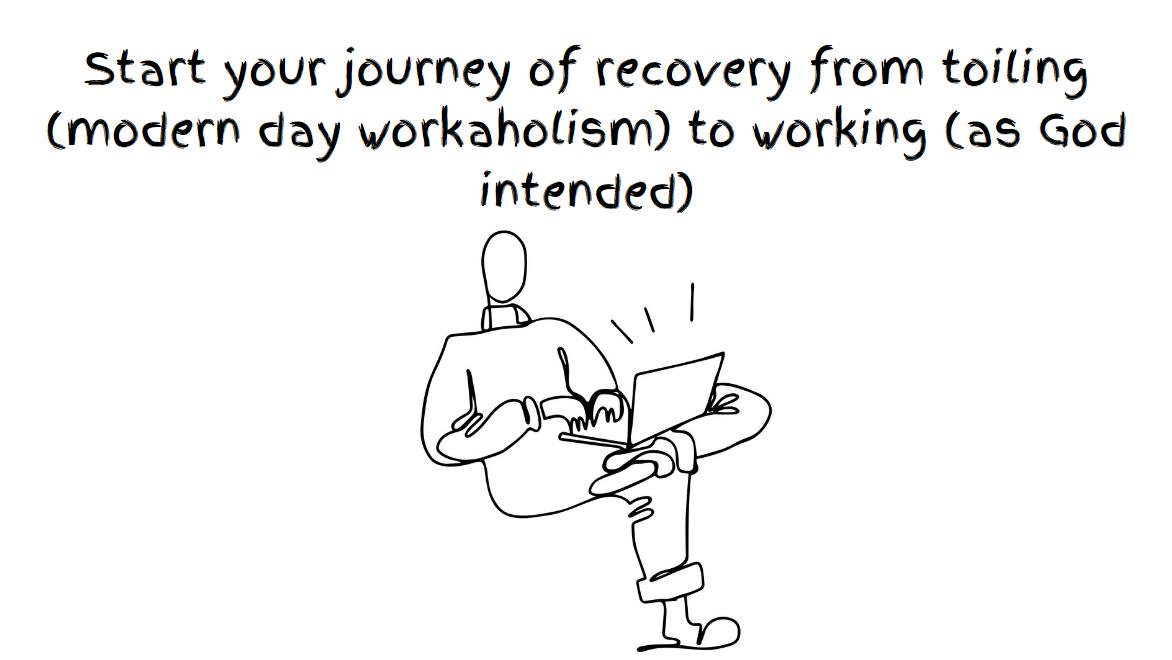
Join me on WhatsAapp https://wa.me/p/7699673513457099/254720817962
𝐓𝐨𝐝𝐚𝐲’𝐬 𝐒𝐮𝐦𝐦𝐚𝐫𝐲: 𝐌𝐲 𝐑𝐞𝐟𝐥𝐞𝐜𝐭𝐢𝐨𝐧 𝐨𝐧 𝐂𝐨𝐧𝐧𝐞𝐜𝐭𝐢𝐧𝐠 𝐭𝐨 𝐭𝐡𝐞 𝐕𝐢𝐧𝐞
The foundational tool to recovery from modern-day workaholism to working without toiling is this: purpose!
Purpose is the driving force that gives meaning and direction to our lives. It helps us prioritise what truly matters and allows us to find fulfilment in our work. By aligning ourselves with our true purpose, we can break free from the cycle of workaholism and find a healthier balance between work and rest. So, take this time to reflect on your purpose and how it can guide you towards a more meaningful and fulfilling life. Trust that the Holy Spirit will illuminate your path and empower you to live.
We will miss out on what the Creator intended for us if we ignore the manual (the Bible). We can easily end up underusing, misusing, or abusing our potential and purpose. Have you read the manual of yourself from the Creator? Could this be the reason you are not operating at your optimal level?
Are you the branch that is pruned to bear more fruit or the disconnected one that is withering and is due to be cast into the fire? It is essential for you to reflect on your connection with the Creator and examine whether you are aligning yourself with His intended purpose for your life. By seeking guidance from the manual (the Bible) and allowing the Holy Spirit to guide you, you will find fulfilment and live a life that bears fruit.
On the contrast, ignoring this vital aspect may lead you to miss out on the abundant life that awaits you. Let’s continue the journey to restoring the heart of worship in our daily work.

Subscribe to join me, let's journey together...


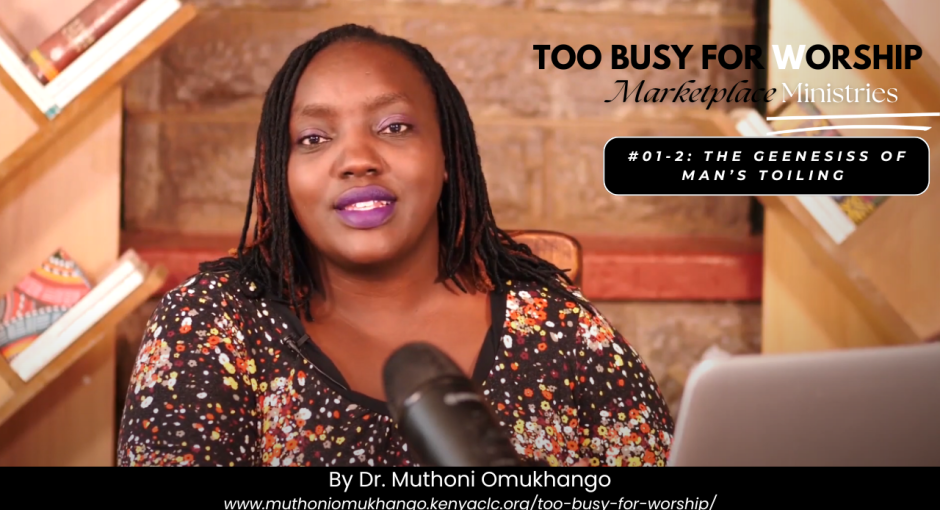


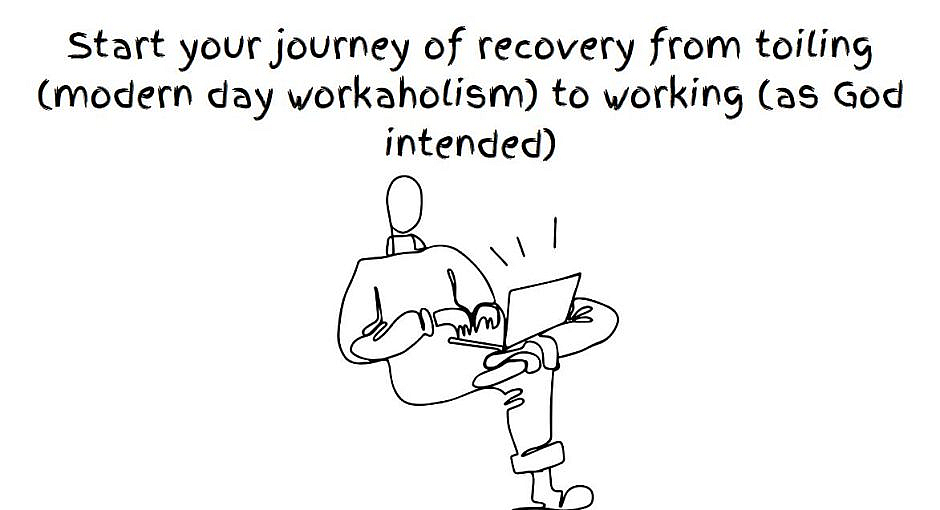
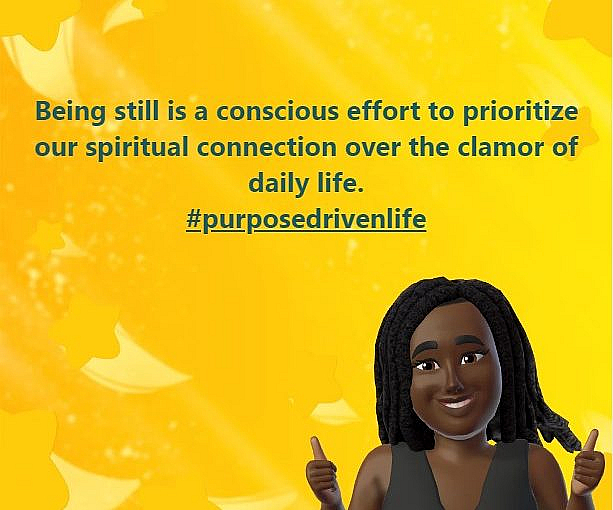
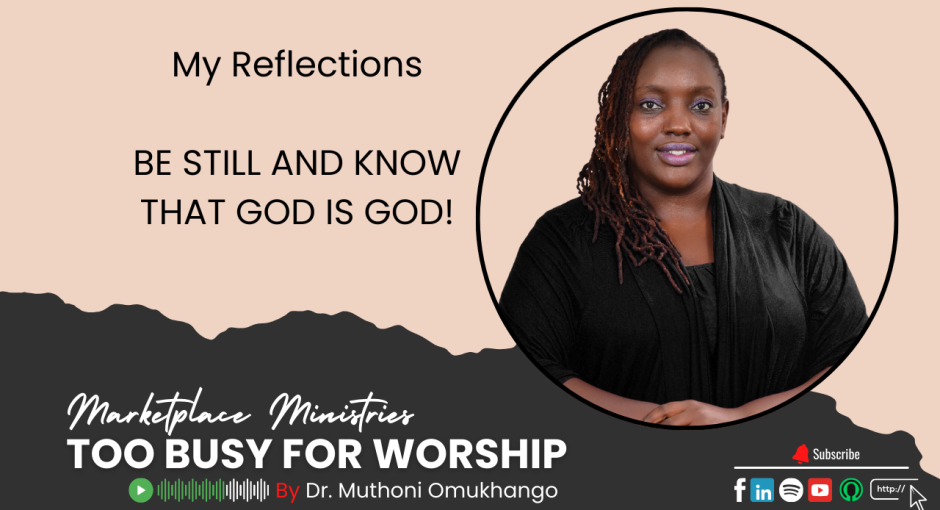
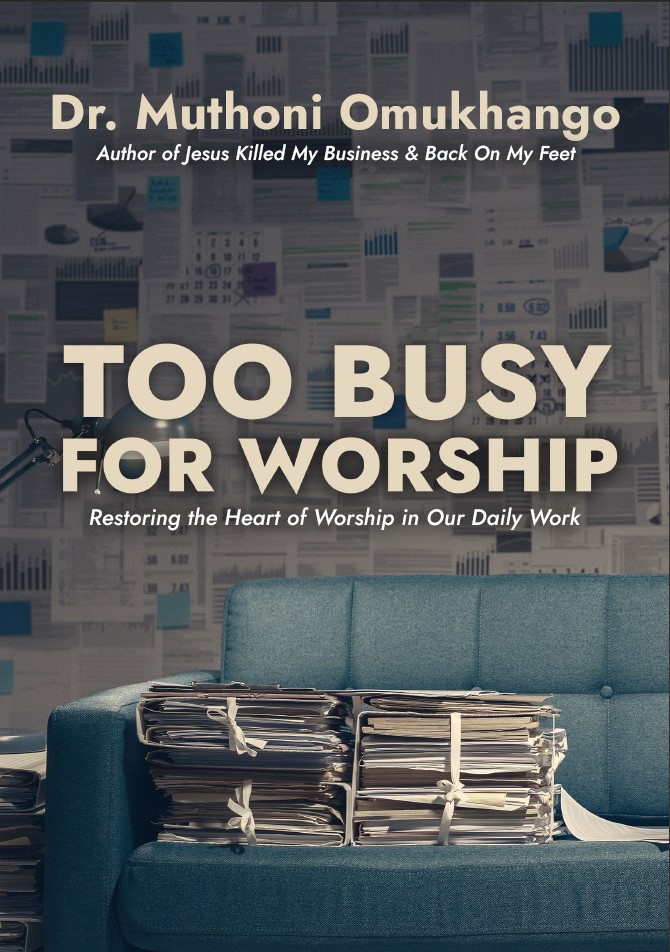
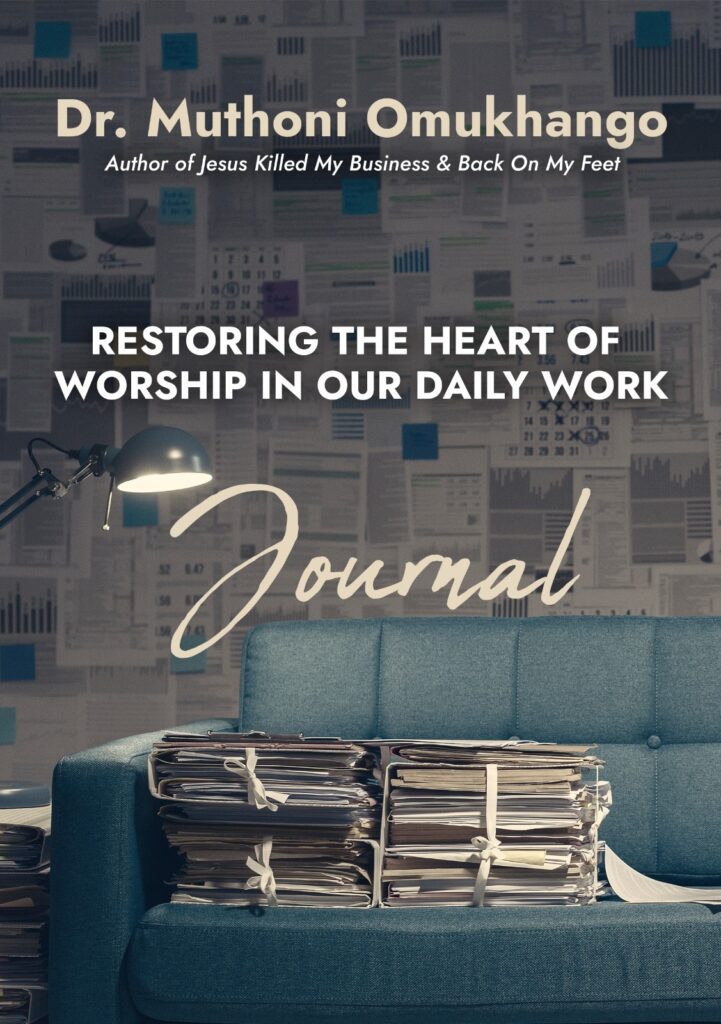
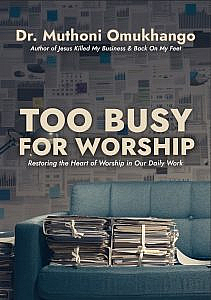




1 comments On Session 2: The Busy-ness Metre (For Too Busy For Worship)
Pingback: Too Busy For Worship - Reflections By Muthoni Omukhango ()